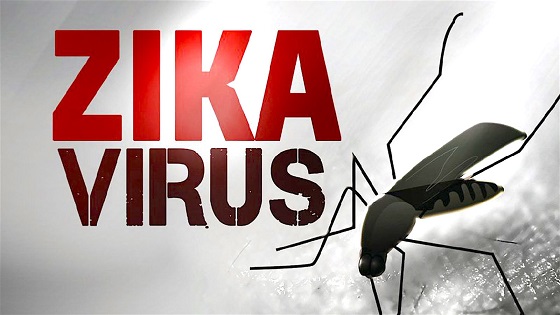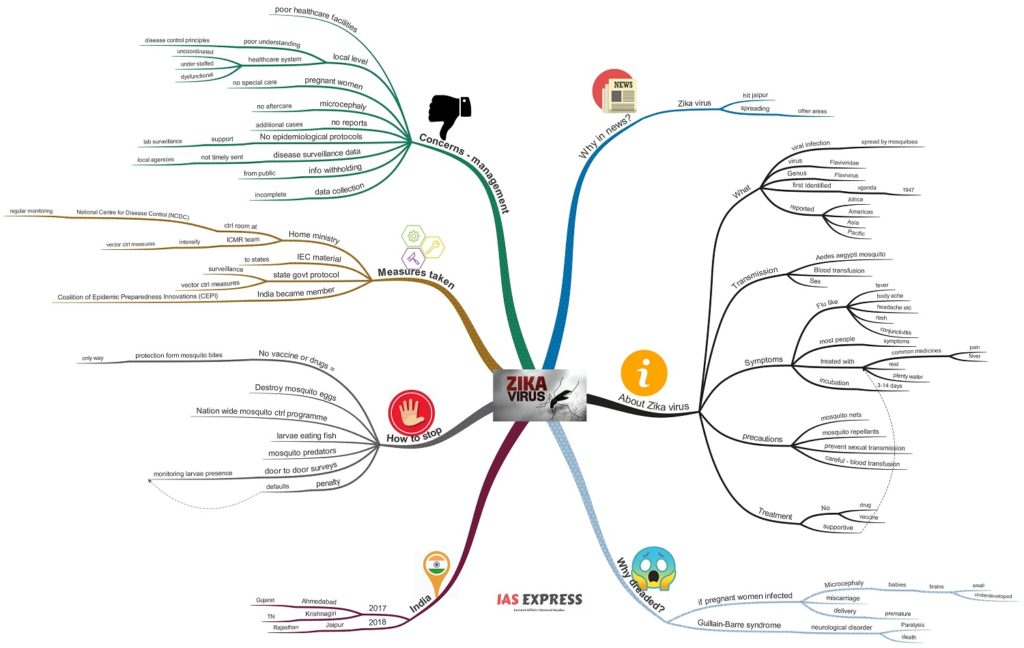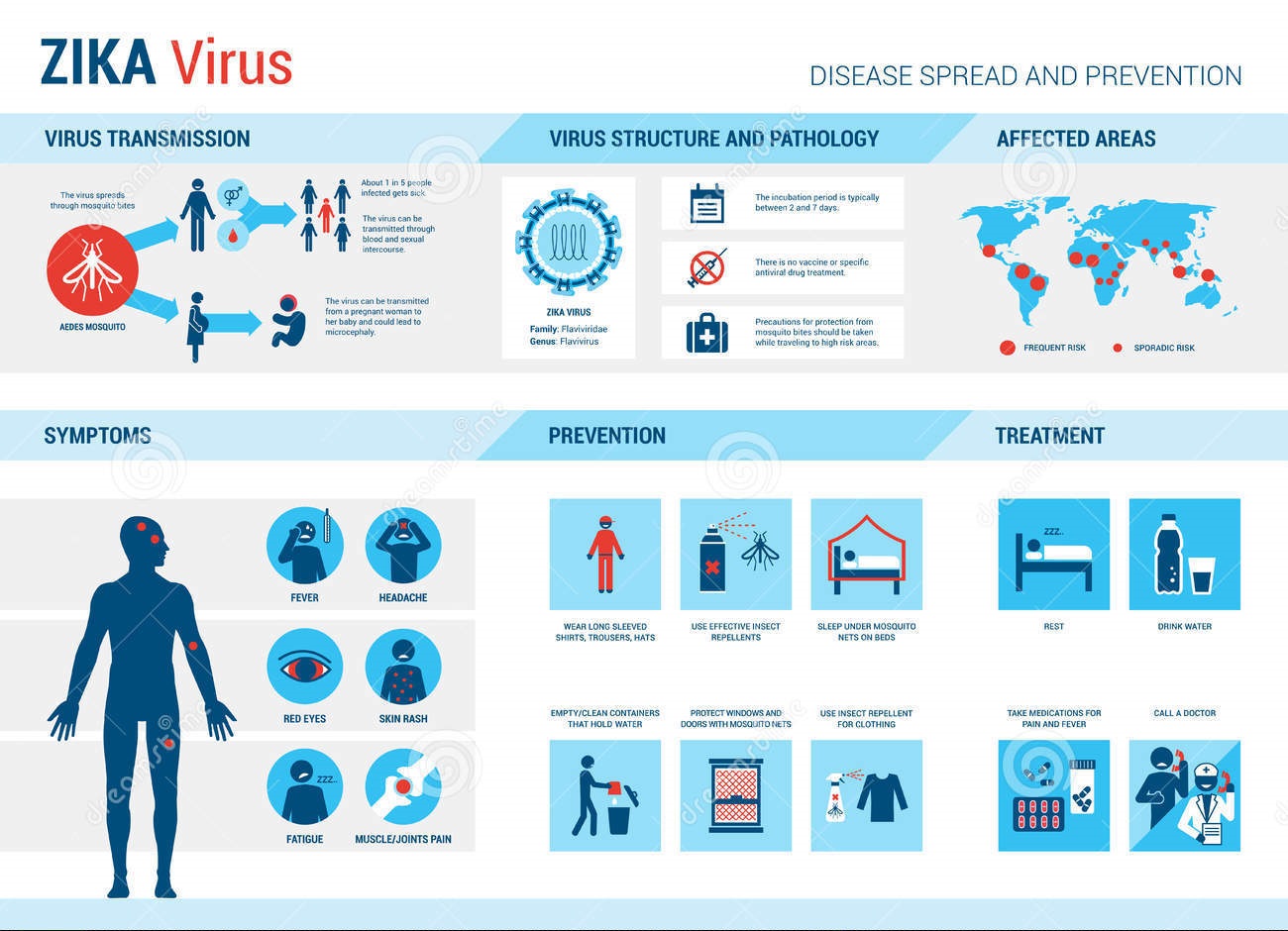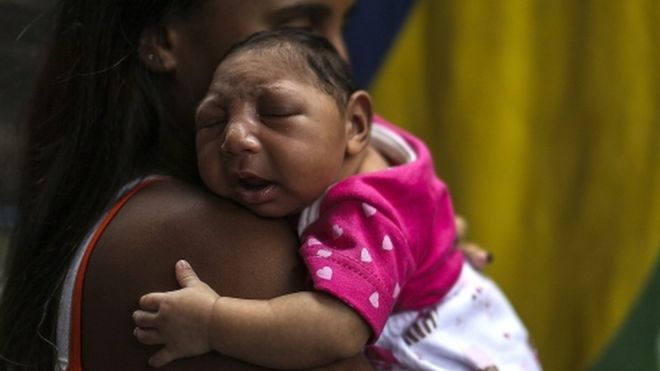Zika Virus Outbreak- The Need for Effective Epidemic Management

From Current Affairs Notes for UPSC » Editorials & In-depths » This topic
IAS EXPRESS Vs UPSC Prelims 2024: 85+ questions reflected
The Zika virus has hit Jaipur, Rajasthan and it has the risk of spreading to other areas as well. With the number of cases rising steadily, the central government has sent an Indian Council of Medical Research (ICMR) Team to Rajasthan to intensify vector control measures. Notably, a broad range of initiatives are being taken by authorities to control Zika, however, they are being viewed as a delayed response to an epidemic.
About Zika Virus
Zika is a viral infection spread by mosquitoes. The virus belongs to family Flaviviridae and Genus Flavivirus. It was first identified in 1947 in Zika Forest, Uganda from where it derives its name. Since 1947, the outbreaks have been reported across 86 nations in Africa, the Americas, Asia, and the Pacific.
Transmission: The vector or carrier for Zika is the day-biting Aedes aegypti mosquito, that also spreads dengue and chikungunya. Infected people can also transmit Zika sexually or through blood transfusion.
Symptoms:
- The symptoms are similar to those of flu such as fever, body ache, headache etc.
- Additional symptoms can include rash like that of dengue, while some patients may have conjunctivitis (inflammation of the eye).
- But most people infected with the virus do not develop symptoms.
- According to WHO, these symptoms can be treated with common pain and fever medicines, rest and plenty of water.
- The incubation period (time from exposure to symptoms) of Zika virus disease is 3-14 days.
Precautions: Precautions are mostly the same as for dengue such as using mosquito nets and repellents in addition to taking steps for preventing sexual transmission.
Treatment: There is no drug or vaccine available against Zika. The treatment is mainly supportive by treating symptoms rather than curing the disease itself. Hence, Vector control is the key to prevention and control of Zika virus infection.
Why Zika is dreaded more than other vector-borne infections?
- Zika is feared especially when pregnant women are infected. It is due to Microcephaly, a condition in which babies are born with small and underdeveloped brains. It also causes miscarriage or premature delivery.
- Some countries that have had a Zika outbreak like Brazil, reported a steep increase in Guillain-Barre Syndrome, a neurological disorder that could result in paralysis and death.
What is the incidence of Zika in India?
- The first outbreak in India was reported in Ahmedabad, Gujarat in Jan-Feb 2017.
- The second outbreak was reported after 5 months in Krishnagiri, Tamil Nadu.
- Both were successfully contained by means of intensive surveillance and vector management.
- The Jaipur outbreak is the third episode of Zika eruption in India in less than 2 years.
- Hence the disease continues to be on surveillance radars of the Union Health Ministry, even though it is no longer a public health emergency of international concern, according to WHO.
How to stop the outbreak?
- In the absence of any vaccine or drugs to cure Zika, protection from the mosquito bite and mosquito control are the only ways to combat this menace.
- This requires breaking the breeding cycle of mosquitoes by destroying their eggs and larvae instead of just killing the adult mosquitoes as is usually done through fogging.
- A nationwide mosquito control programme which in the past had helped in nearly eradicating malaria is once again needed. The present National Vector-borne Diseases Control Programme has not been implemented properly and is utilized only during epidemics. Thus it should be implemented on a regular basis on the lines of the polio control programme to combat Zika as well as other Vector-borne diseases like dengue, malaria, Japanese encephalitis etc.
- Measures like deploying larvae-eating fish and mosquito predators in order to the control the multiplication of mosquitoes are needed.
- Aedes mosquitoes breed even in small collections of fresh water in and around homes, schools and work sites. Therefore, door-to-door surveys for monitoring the presence of larvae and a suitable penalty against the defaulters should be implemented.
What are the measures taken?
- The home ministry has taken precautionary measures followed by daily monitoring. It has activated control room at National Centre for Disease Control (NCDC) to undertake regular monitoring of the situation.
- The ministry also deployed an Indian Council of Medical Research Team to Rajasthan to intensify vector control measures.
- The state government also has been provided with IEC Material (Information, Education & Communication) in order to create awareness about Zika virus disease and its prevention strategies.
- Furthermore, extensive surveillance and vector control measures are also being undertaken in the area as per the protocol of the state government.
- India also became a member of Coalition of Epidemic Preparedness Innovations (CEPI) which is a global alliance of governments, intergovernmental institutions such as WHO, health specialists, and philanthropists in order to finance and coordinate the development of a new vaccine to prevent and contain infectious disease epidemics like Zika.
What are the concerns with our epidemics surveillance and management system?
- Poor healthcare facilities.
- At the local level, there is a very poor understanding of disease control principles, and also an uncoordinated, under-staffed and dysfunctional system.
- Lack of special care for pregnant women.
- Lack of aftercare in case of microcephaly occurrence.
- No reports were prepared for checking if there were additional cases in the area.
- No epidemiological protocols available to support laboratory surveillance.
- Public resources have been spent on collecting data on various diseases across the country. But the disease surveillance data are not being sent timely to local agencies so that they can implement mosquito-control measures and stop Zika virus transmissions.
- Withholding information to the public violating their right to know what happened after the cases were identified.
- Incomplete or poorly collected data is even more damaging as it can provide wrong information for health planning activities.
What is the way forward?
Poor health communication and its disastrous consequences amongst the public have a catastrophic impact on the country’s economy. The aim is not only to collect data but to use this data wisely for protecting the health of the population. Thus the critical role of the government in demonstrating leadership and guiding disharmonious participants is essential. For the long-term impact, the government along with private should invest heavily in research and development activities in developing a viable vaccine or drug to cure the disease.
Practice Question
In the light of recent Zika virus outbreak in Rajasthan, critically evaluate India’s disease surveillance systems and suggest suitable reforms.
If you like this post, please share your feedback in the comments section below so that we will upload more posts like this.




